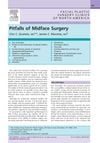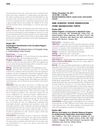 6 citations,
September 2013 in “The Obstetrician & Gynaecologist”
6 citations,
September 2013 in “The Obstetrician & Gynaecologist” Pregnancy can cause unique skin issues, some of which may risk the mother and baby's health and need careful treatment.
12 citations,
November 2020 in “Transplant international” Hand and forearm transplants can be successful long-term, but they come with challenges like rejection and side effects from immunosuppression.
 30 citations,
December 2018 in “Trends in Endocrinology and Metabolism”
30 citations,
December 2018 in “Trends in Endocrinology and Metabolism” Both immature and mature fat cells are important for hair growth cycles, with immature cells promoting growth and mature cells possibly inhibiting it.
 11 citations,
February 2011 in “Current Zoology”
11 citations,
February 2011 in “Current Zoology” About 20% of Japanese macaques had head alopecia, and stress and environment might cause hair loss.
 1 citations,
January 2009 in “CRC Press eBooks”
1 citations,
January 2009 in “CRC Press eBooks” Finasteride increases hair count and improves hair growth with low risk of side effects.
 3 citations,
October 2023 in “Military Medical Research/Military medical research”
3 citations,
October 2023 in “Military Medical Research/Military medical research” Regulatory T cells help heal skin and grow hair, and their absence can lead to healing issues and hair loss.
 2 citations,
May 2018 in “Expert opinion on orphan drugs”
2 citations,
May 2018 in “Expert opinion on orphan drugs” Newborn screening and gene therapy are expected to improve outcomes for Omenn syndrome patients.
 5 citations,
August 2005 in “Facial Plastic Surgery Clinics of North America”
5 citations,
August 2005 in “Facial Plastic Surgery Clinics of North America” Midface surgery complications are generally rare and manageable with skilled surgery and informed patients.
 2 citations,
October 2020 in “Journal of The American Academy of Dermatology”
2 citations,
October 2020 in “Journal of The American Academy of Dermatology” The authors suggest that scalp hair might protect against COVID-19 and call for more research on scalp health and the virus.
 June 2007 in “Faculty Opinions – Post-Publication Peer Review of the Biomedical Literature”
June 2007 in “Faculty Opinions – Post-Publication Peer Review of the Biomedical Literature” Hair can regrow in adult mice's skin after injury, and this regrowth doesn't come from existing hair cells but from skin cells in the wound, with Wnt7a protein helping this process. This could help treat baldness and scarring.
 May 2007 in “Faculty Opinions – Post-Publication Peer Review of the Biomedical Literature”
May 2007 in “Faculty Opinions – Post-Publication Peer Review of the Biomedical Literature” Hair can regrow in adult mice's skin after injury, and this regrowth doesn't come from existing hair cells but from skin cells in the wound, with Wnt7a protein helping this process. This could help treat baldness and scarring.
 May 2007 in “Faculty Opinions – Post-Publication Peer Review of the Biomedical Literature”
May 2007 in “Faculty Opinions – Post-Publication Peer Review of the Biomedical Literature” Hair can regrow in adult mice's skin after injury, and this process can be boosted by increasing Wnt7a, a protein. This could potentially help treat baldness and change our understanding of hair growth.

The man's scalp tightness after hair surgery affects his life and work, and it's unclear if it's due to the surgery or a mental health issue.
 5 citations,
December 2021 in “Scientific Reports”
5 citations,
December 2021 in “Scientific Reports” Age affects how certain proteins involved in COVID-19 infection are expressed in mice, but sex hormones and heart injury do not.
 7 citations,
May 2022 in “The Journal of Dermatology”
7 citations,
May 2022 in “The Journal of Dermatology” Hair loss is a frequent long-term effect of COVID-19, and oral minoxidil is the most common effective treatment.
 3 citations,
November 2020 in “Journal of The American Academy of Dermatology”
3 citations,
November 2020 in “Journal of The American Academy of Dermatology” The document suggests that more research is needed to confirm if baldness can indicate a higher risk of severe COVID-19 in men.
 August 2023 in “Iranian Journal of Clinical Infectious Diseases”
August 2023 in “Iranian Journal of Clinical Infectious Diseases” Most skin issues were due to COVID-19, with some caused by vaccines or treatments, and were categorized into five types.
8 citations,
February 2022 in “Frontiers in Medicine” COVID-19 may trigger severe skin flare-ups in people with autoimmune conditions like lupus.
 March 2022 in “Journal of clinical case studies reviews & reports”
March 2022 in “Journal of clinical case studies reviews & reports” COVID-19 can cause different skin issues, including rashes and hair loss.
 185 citations,
August 2020 in “Mayo Clinic Proceedings”
185 citations,
August 2020 in “Mayo Clinic Proceedings” Men are more likely to have severe COVID-19 cases and fatalities than women due to factors like lifestyle, aging, and biological differences.
 2 citations,
January 2023 in “Dermatology practical & conceptual”
2 citations,
January 2023 in “Dermatology practical & conceptual” COVID-19 diagnosis is linked to new or worsening hair diseases, with stress from the pandemic likely contributing.
 7 citations,
January 2021 in “Biology”
7 citations,
January 2021 in “Biology” Some COVID-19 patients have different skin problems, which might be the only sign of the virus or related to other health issues.
 4 citations,
March 2021 in “International Journal of Dermatology”
4 citations,
March 2021 in “International Journal of Dermatology” COVID-19 and related stress may increase hair loss known as Telogen effluvium.
 1 citations,
August 2022 in “JAAD Case Reports”
1 citations,
August 2022 in “JAAD Case Reports” A woman's complete hair loss condition improved after recovering from COVID-19.
 4 citations,
September 2017 in “Skin appendage disorders”
4 citations,
September 2017 in “Skin appendage disorders” The dog with an Alopecia Areata-like condition showed signs of an autoimmune disease and partially regrew hair without treatment, suggesting dogs could be models for human AA research.
 November 2021 in “Research Outreach”
November 2021 in “Research Outreach” Low testosterone levels may lead to more severe COVID-19 outcomes.
 5 citations,
February 2010 in “Expert Review of Dermatology”
5 citations,
February 2010 in “Expert Review of Dermatology” Treating both the mind and skin together, especially by managing stress, can greatly improve outcomes for skin disorders linked to psychological issues.
 123 citations,
May 2020 in “Drug Development Research”
123 citations,
May 2020 in “Drug Development Research” Men's sensitivity to male hormones might affect how severe COVID-19 gets for them.
 35 citations,
November 2020 in “Dermatologic Therapy”
35 citations,
November 2020 in “Dermatologic Therapy” Severe COVID-19 may cause hair loss, and doctors recommend supplements and topical treatments to manage it.
 113 citations,
July 2020 in “Communications biology”
113 citations,
July 2020 in “Communications biology” Men, especially older ones with health issues like prostate cancer, may have worse COVID-19 outcomes and could benefit from therapies targeting male hormones.




























